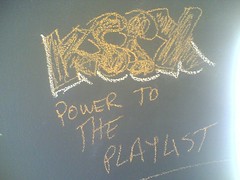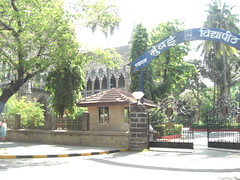OpenEd: Week 8
October 24, 2007, [MD]
Common Wisdom: Peer Production of Educational Materials Print version (Benkler, 32 pages)
Advancing Sustainability of Open Educational Resources (Koohang and Harman, 10 pages)
On the Sustainability of Open Educational Resource Initiatives in Higher Education (Wiley, 20 pages)
Models for Sustainable Open Educational Resources (Downes, 16 pages)
QUESTIONS: How can you build a sustainable business around giving away educational materials? How can you build a sustainable business model around giving away credentialed degrees? Should governments fund open education? (Do they already?)
 Coming
from a country that already provides free education for all its
citizens, including university level (Norway), I clearly believe that
the state should “fund open education”. Indeed, it is strange that the
early movers in this space have been large privately funded US
institutions, and not the larger state-funded European universities,
with mandates to serve the whole population (the Open University in the
UK might be a good exception). When I was in China teaching in
university, I used to boast about how in Norway even a street-sweeper
(if we still had those), or a homeless person, could follow all the
lectures of a given course for free (and legally - not by sneaking in),
get a library card at the university library and check out all the books
he or she wanted, etc. There is no reason why this shouldn’t be extended
into the virtual space (as for access, luckily most Norwegian small
cities have libraries that offer free access to the internet nowadays).
Coming
from a country that already provides free education for all its
citizens, including university level (Norway), I clearly believe that
the state should “fund open education”. Indeed, it is strange that the
early movers in this space have been large privately funded US
institutions, and not the larger state-funded European universities,
with mandates to serve the whole population (the Open University in the
UK might be a good exception). When I was in China teaching in
university, I used to boast about how in Norway even a street-sweeper
(if we still had those), or a homeless person, could follow all the
lectures of a given course for free (and legally - not by sneaking in),
get a library card at the university library and check out all the books
he or she wanted, etc. There is no reason why this shouldn’t be extended
into the virtual space (as for access, luckily most Norwegian small
cities have libraries that offer free access to the internet nowadays).
Talking about sustainable, it’s funny that just this week a discussion about this course should erupt, and we are asking if it is sustainable to offer this course for free - and we are told that our teacher (perhaps understandably) prioritizes the fee-paying students. I have commented a bit on this earlier, but one thing that I wanted to add is that we need to think about how this course can make a lasting contribution to the OER realm. I am very glad, upon checking the curriculum, that the last week of class is dedicated to reflection upon the course - I hope we can have a really good discussion about how this course was structured, what the motives or visions behind that structure were, to what extent they were fulfilled, and how the course could be better designed.
But in addition to that, a lot of the readings have talked about OERs not being something that is designed for learners, but is something that learners produce as a side-effect of the process of learning - so how has our participation in this class contributed to help the next learners on open education? What materials have we produced, assembled, gathered, translated, marked up, mashed up, personalized, modularized?
 There
are many different aspects to sustainability, because there are many
kinds of material. I think that by structuring their way of preparing
material slightly differently, professors could make a lot of the
material that they produce for class anyway public for very little cost
(as mentioned earlier, University of Oslo puts all their curricula for
all their classes online, and have never called that OER, only an
obvious service to students). Ideally university professors could
collaborate online, and by spending the same amount of time they now
spend on creating question sets and overheads, they could create really
valuable textbook-like resources.
There
are many different aspects to sustainability, because there are many
kinds of material. I think that by structuring their way of preparing
material slightly differently, professors could make a lot of the
material that they produce for class anyway public for very little cost
(as mentioned earlier, University of Oslo puts all their curricula for
all their classes online, and have never called that OER, only an
obvious service to students). Ideally university professors could
collaborate online, and by spending the same amount of time they now
spend on creating question sets and overheads, they could create really
valuable textbook-like resources.
However, “commons-based peer production” is also really valuable, and Wikipedia is of course an incredible OER in itself - not only as a stand-alone work, but as something that can be copied-and-pasted from, both in terms of text, and in terms of incredible illustrations that are all open to use (and won’t make your material non-distributable). Benkler makes a point in that it is not necessarily as easy to break up into small portions and distribute widely as Wikipedia, if we want more “coherent” pieces of work, but in a sense a lot of this is being created already today - people writing textbooks for their classes, or at least long articles… If we can just collect them all, make them available under open licenses, translate them, and have people use them actively - that might be a very good start. And I really like the system of “lenses” that Connexions provide, more so than absolute “peer-review” because material really useful to some learners, won’t be useful to others. This goes together with the idea of “playlist classes”.
 Finally
(and I am talking to a large extent about higher education and further
education for educated adults here, because that’s where a lot of my own
thinking focuses), the movement for open access to academic research is
really a movement for open OER as well - in a lot of my courses, all our
readings are collections of articles. So perhaps then, at a university
level, open education would consist of a selected (playlist/lense)
collection of open access articles, plus a learning support community
(like this class), with assignments, deadlines, feedback mechanisms,
etc.
Finally
(and I am talking to a large extent about higher education and further
education for educated adults here, because that’s where a lot of my own
thinking focuses), the movement for open access to academic research is
really a movement for open OER as well - in a lot of my courses, all our
readings are collections of articles. So perhaps then, at a university
level, open education would consist of a selected (playlist/lense)
collection of open access articles, plus a learning support community
(like this class), with assignments, deadlines, feedback mechanisms,
etc.
As for accreditation, I do think and hope that eventually society will become more flexible about accreditation, because right now it’s very coarse - one of the things mentioned in Jeff Rybak’s book “What’s wrong with university - and how to make it work for you” is the fact that most employers only look at your degree and not your grade. So all they see is “he/she did four years of schooling”. And for the top students, the only way to differentiate themselves is to do grad school “he/she did six years of higher ed, great”… With the incredible amount of options for learning autonomously and the need for continuous learning, and the eventual and necessary reform of university as an institution, this view could hopefully change. Until then, one interesting model is one that the Economist has been advocating (and unfortunately I cannot find the article in their archives - full-text search is failing me) of having world-class universities like Harvard or MIT separate their teaching arm from their evaluation arm. So that anyone in the world willing to pay a small administrative fee, could take a comprehensive Harvard exam, and if they passed, get a Harvard degree that was just as valid as any “Harvard” student.
 The
neat thing about this is that it would force the education arm to really
compete on education, not on name recognition. Are Harvard students
better, because they got a better education, or because Harvard just
admits the best students? And it would mean that hyper-smart people that
didn’t have the money or the connections to get a scholarship could use
OERs and online communities of learners and scholars to gain the same
amount of knowledge and insight, and receive recognition for it. (This
is similar to what happens with the International Baccalaureate, which I
did for my high school, and another side effect of this is that since
the teacher is no longer evaluating you, and has no impact on your final
grade, your roles change, and your teacher can become more of your
partner, or accomplice. You both know the final goal, and hopefully your
teacher can help you get there.)
The
neat thing about this is that it would force the education arm to really
compete on education, not on name recognition. Are Harvard students
better, because they got a better education, or because Harvard just
admits the best students? And it would mean that hyper-smart people that
didn’t have the money or the connections to get a scholarship could use
OERs and online communities of learners and scholars to gain the same
amount of knowledge and insight, and receive recognition for it. (This
is similar to what happens with the International Baccalaureate, which I
did for my high school, and another side effect of this is that since
the teacher is no longer evaluating you, and has no impact on your final
grade, your roles change, and your teacher can become more of your
partner, or accomplice. You both know the final goal, and hopefully your
teacher can help you get there.)
Of course, one could argue that this would just lead to dumbed down cramming and MAs taken through multiple choice exams, but perhaps we could take this as a challenge to create a truly comprehensive and deep way of evaluation. In addition, one could argue that it would kill the autonomy that the professors have to create truly unique learning experiences, but in fact, what might be needed in higher education (especially at undergraduate level) is more peer-review of teaching, because too many professors take the academic freedom to teach what they want, as freedom to not give their best to students who couldn’t care less… And you can’t convince me that there is any reason that Econ 101 should be completely different, or expect completely different things from students across a lot of different universities (at least not in the same region/country).
Stian\ (thanks to michael @ flickr for the arches photo, Bond Sarah @ flickr for the empty chairs photo, roland @ flickr for the playlist photo and Swami Stream @ flickr for the photo of Mumbai university)
Stian Håklev October 24, 2007 Toronto, Canada comments powered by Disqus